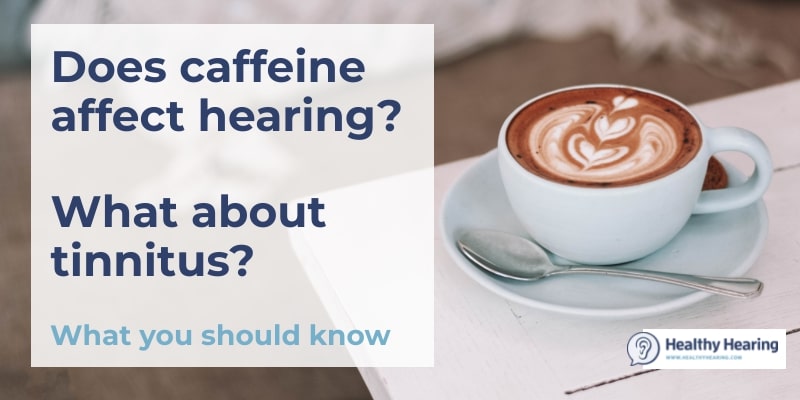|
www.HealthyHearing.com |
What the research says about caffeine, hearing loss and tinnitus
Contributed by Joy Victory, managing editor, Healthy Hearing Wondering how caffeine intake might affect your hearing, especially when it comes to hearing loss and tinnitus (ringing in the ears)? What about Meniere's disease? This isn't a heavily studied topic of research, and for the most part, it does not seem that caffeine intake plays a big role in hearing health overall.
What is caffeine?Caffeine is a natural stimulant found in coffee, tea and chocolate. It's also an added ingredient to energy drinks as well as some non-prescription cold and allergy medications and pain relievers. It stimulates the central nervous system, improving circulation and focus and keeps us from feeling tired after a late night on the town. In fact, studies indicate that the antioxidants found in coffee may reduce the risk of certain cancers, such as liver and breast cancer. However, excessive caffeine intake is associated with negative health effects including high blood pressure, heart problems and insulin resistance. Does caffeine affect hearing loss?Blood flow is an important part of healthy hearing. Since caffeine can restrict blood flow and increase blood pressure, scientists have wondered if there is a relationship between the two. For the most part, it does not appear that average caffeine intake (up to 2 cups of coffee day) will have much of an impact on your hearing in the long-term. A large Korean observational study found no connection. In fact, it found that people who drank coffee had lower rates of hearing loss than non-coffee drinkers. A study in the US confirmed this finding, concluding that increased caffeine metabolites in the body were not linked to shifts in hearing thresholds. Caffeine may worsen temporary hearing loss after noise exposureEver left a really noisy event and your hearing felt funny and muffled? You likely experienced temporary threshold shift (TTS), a sign that the delicate hair cells of your inner ear are overworked and fatigued. Under normal conditions, your hearing should recover in a few days, if not sooner. It might help to skip any large doses of caffeine until your hearing is back to normal: Daily consumption of caffeine may prolong recovery from TTS, a 2016 study showed. However, the study was conducted on a small group of guinea pigs, so it remains unclear if caffeine might have the same effect in people. And some cancer patients should be cautious, tooCancer patients who take the drug cisplatin should be careful with caffeine intake. Drug-induced hearing loss and tinnitus are common side effects of cisplatin and other platinum-based chemotherapy drugs like carboplatin or oxaliplatin. A 2019 study on lab rats showed that adding caffeine further increased the risk of hearing loss. The study authors concluded that "these findings highlight a possible drug-drug interaction between caffeine and cisplatin for ototoxicity and suggest that caffeine consumption should be cautioned in cancer patients treated with a chemotherapeutic regimen containing cisplatin." 
links between caffeine consumption and hearing loss. What about tinnitus and caffeine?Some tinnitus patients report an improvement in symptoms when they cut back on caffeine. If you also find it useful, then by all means, cut back. Just keep in mind that so far, research hasn't shown that cutting back will reduce tinnitus. In fact, one study on women actually found lower rates of tinnitus among women who reported heavy coffee use. This is similar to a previous study finding that indicated "caffeine abstinence" was an ineffective treatment for tinnitus. However, the potential withdrawal effects from halting caffeine might be distressing, making it more challenging to deal with tinnitus symptoms.
Meniere's disease and caffeinePatients who have Meniere's disease are sometimes told to cut back on alcohol, salt and caffeine to help alleviate symptoms. Anecdotally, diet changes can be very helpful for some people, especially low-salt diets. But there's scant evidence on the topic, especially when it comes to caffeine and alcohol. Theoretically, "caffeine and alcohol intake can result in constriction of blood vessels (vasoconstriction) and could result in a reduction in the blood supply to the inner ear, which may make patients' symptoms worse," state the authors of an evidence review on Meniere's and dietary changes. "Many doctors advise dietary changes as a first‐line treatment as it is thought to be a relatively simple and inexpensive option," they added. But frustratingly, the review authors found no high-quality studies on the topic at all. "This intervention is widely recommended to patients without any proven benefit or clear understanding of any potential harms. This may delay the use of more effective treatment options resulting in disease progression and patient suffering or adverse effects," the authors state. Bottom lineThe relationship between caffeine and hearing health has not been studied enough to know what, if any, impact caffeine has on hearing loss, tinnitus or auditory conditions like Meniere's disease. If you enjoy coffee, soda or energy drinks and are otherwise healthy, there is no hearing-related research indicating you should stop. That said, if you want to see if cutting back on caffeine helps you, then by all means give it a try. Note: This piece originally published in August 2021. It was updated and medically reviewed in July 2023 by Dr. Patricia Weiser, a licensed pharmacist and medical writer. She obtained her Doctor of Pharmacy degree at the University of Pittsburgh. Joy Victory, managing editor, Healthy Hearing
Related Help Pages:
Hearing loss Symptoms Types Causes Tinnitus (ringing in the ears) Causes Treatment Meniere's disease
|
Featured clinics near me
Earzlink Hearing Care - Reynoldsburg
7668 Slate Ridge Blvd
Reynoldsburg, OH 43068

Find a clinic
Need a hearing test but not sure which clinic to choose?
Call 1-877-872-7165 for help setting up a hearing test appointment.



 Joy Victory has extensive experience editing consumer health information. Her training in particular has focused on how to best communicate evidence-based medical guidelines and clinical trial results to the public. She strives to make health content accurate, accessible and engaging to the public.
Joy Victory has extensive experience editing consumer health information. Her training in particular has focused on how to best communicate evidence-based medical guidelines and clinical trial results to the public. She strives to make health content accurate, accessible and engaging to the public.